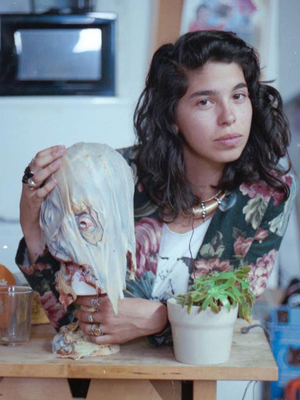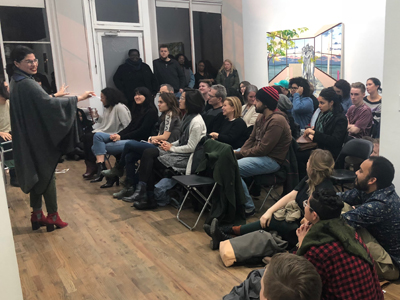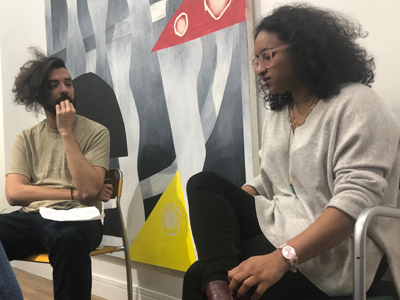Natasha Mijares is an artist, writer, curator, and educator. She received her MFA in Writing from the School of the Art Institute of Chicago. She has exhibited at MECA International Art Fair in Puerto Rico, Sullivan Galleries, TCC Chicago, and Locust Projects and has been published in Container, Calamity, Vinyl Poetry, Bear Review, and Hypertext Magazine. She is a teaching artist for the Poetry Center of Chicago’s creative literacy residency program in Chicago public schools, Hands on Stanzas, and curates and hosts the Six Points Reading Series.
 The Poetry Center of Chicago (PCC) was founded in 1974, and we work hard to promote poetry in Chicago through readings, workshops, and arts education. Something that I have been working on at PCC is to offer more workshops for adults. Last year, we had a poetry and dance workshop with Ana Castillo and the nonprofit organization Chicago Danztheatre Ensemble, thanks to the generous support of Poets & Writers’ Readings & Workshops program. With this continued support, I was able to organize a morning workshop with poet Kaveh Akbar as well as an evening reading and discussion with him and Tarfia Faizullah that took place on January 26.
The Poetry Center of Chicago (PCC) was founded in 1974, and we work hard to promote poetry in Chicago through readings, workshops, and arts education. Something that I have been working on at PCC is to offer more workshops for adults. Last year, we had a poetry and dance workshop with Ana Castillo and the nonprofit organization Chicago Danztheatre Ensemble, thanks to the generous support of Poets & Writers’ Readings & Workshops program. With this continued support, I was able to organize a morning workshop with poet Kaveh Akbar as well as an evening reading and discussion with him and Tarfia Faizullah that took place on January 26.
The workshop sign-up was open to the public and took place at Loyola University Chicago. We had twenty-three participants from all kinds of backgrounds, ages, and places in the city. Kaveh Akbar opened up the workshop by discussing the unique architecture of our psychic algorithms and how this allows us to create a restorative experience of language that is uniquely our own. He led two activities to be used as sustainable tools for the writing practice.
 The first activity incorporated a “bibliomanic” response in which each participant picked words from poetry books that stood out to them. After acquiring a pile of dazzling words and ideas, the participants were able to craft their own poems and the responses were energetic, playful, and provocative. The second activity was the “one-word story.” In groups of three, two participants began a poem by saying one word at a time and the third participant acted as the scribe. Again, the activity was a trust of the psyche as opposed to any premeditated plan. Akbar stressed how certainty is the death of a poem and how we should trust our reflexive responses.
The first activity incorporated a “bibliomanic” response in which each participant picked words from poetry books that stood out to them. After acquiring a pile of dazzling words and ideas, the participants were able to craft their own poems and the responses were energetic, playful, and provocative. The second activity was the “one-word story.” In groups of three, two participants began a poem by saying one word at a time and the third participant acted as the scribe. Again, the activity was a trust of the psyche as opposed to any premeditated plan. Akbar stressed how certainty is the death of a poem and how we should trust our reflexive responses.
The workshop participants and the PCC staff had a wonderful experience. One of the participants noted: “He was a great teacher—full of curiosity and fun, and he shared that infectiously with us. Akbar’s prompts were really wonderful, they allowed me to get into writing immediately, and led to a great output of work for myself, and it seemed, for others too. I’m so grateful the center was able to offer this workshop for free.”
 In the evening, both poets opened by reading Chicago poets. Tarfia Faizullah read a poem from Fatimah Asghar’s forthcoming debut collection, If They Come for Us (One World, 2018), and Akbar read “off white” by Nate Marshall, before reading from their own collections along with some new work.
In the evening, both poets opened by reading Chicago poets. Tarfia Faizullah read a poem from Fatimah Asghar’s forthcoming debut collection, If They Come for Us (One World, 2018), and Akbar read “off white” by Nate Marshall, before reading from their own collections along with some new work.
Thanks to the support of a micro grant from Illinois Humanities, we were able to have the poets lead a discussion following the reading. Akbar used the space to interview Faizullah about her new book and the discussion lead to questions about Muslim identity, epigenetics, and when to address the self. The audience contributed questions and feedback that pulled us toward the roots of each poet’s work. It made for an evening of honest, warm, and powerful celebrations of poetry and the community that builds it together.
Editor’s Note: For more on Kaveh Akbar, read “The Whole Self: Our Thirteenth Annual Look at Debut Poets” from the January/February 2018 issue of Poets & Writers Magazine. You can also hear Tarfia Faizullah read from her new poetry collection, Registers of Illuminated Villages (Graywolf Press, 2018), in the eighteenth episode of Ampersand: The Poets & Writers Podcast.
Support for Readings & Workshops in Chicago is provided by an endowment established with generous contributions from the Poets & Writers Board of Directors and others. Additional support comes from the Friends of Poets & Writers.
Photos: (top) Natasha Mijares (Credit: German Caceres). (middle) Reading attendees (Credit: Max Maller). (bottom) Kaveh Akbar and Tarfia Faizullah (Credit: Max Maller).






